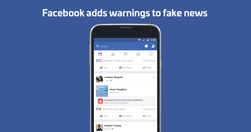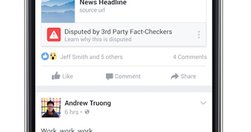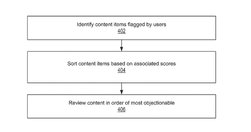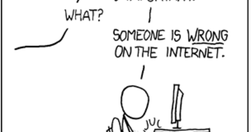Relevant Overviews
- Communication Strategy
- Content Strategy
- Online Strategy
- Online Community Management
- Social Media Strategy
- Content Creation & Marketing
- Online Architecture
- Digital Transformation
- Innovation Strategy
- Communications Tactics
- Psychology
- Social Web
- Media
- Politics
- Communications Strategy
- Science&Technology
- Business

the Facebook Pages seeing the biggest average engagements per post across news, interests, politics, and more

Facebook officially released a tool Monday that lets its users — all desktop and mobile users in the U.S. — easily contact their local officials. It's called "Town Hall," reminiscent of what Facebook likes to see itself as, especially in political discussion.

readers could only remember where they saw a piece of news from, 56 percent of the time... how can you make your content stand out?... an actively engaged community is key. Content that disrupts a user scrolling through the newsfeed, and compels that person to comment, is a far more memorable experience.

Facebook today cannot exist without AI. Every time you use Facebook or Instagram or Messenger... your experiences are being powered by AI... Eventually, this “classifying” step—known as supervised learning—may become automated, as the company pursues an ML holy grail known as “unsupervised learning,” ... Facebook sees the visual cortex merging wit…

to put the blame solely on the company is to overlook how people use the site, and how they themselves create a filter bubble effect through their actions.... Just as important as the algorithm is how people use the site and shape it around their own communications... people are actually exposed to a great deal of diversity through Facebook... But…

We know little about the amount of fake news an average citizen consumes, or how it fits into their overall news diet... What we found calls into question the severity of the fake news crisis.... We gathered data for both the real and fake news sites from comScore... First, the fake news audience is tiny compared to the real news audience–about 1…

Zuckerberg uses abstract language in his memo—he wants Facebook to develop “the social infrastructure for community,” he writes—but what he’s really describing is building a media company with classic journalistic goals... “for keeping us safe, for informing us, for civic engagement, and for inclusion of all.”,,,an assumption that news... will con…

when bot platforms take off, we will be... completing the new shift in data control from the users’ hands to Facebook’s, Google, and Microsoft’s hands... the next big privacy concern... end-to-end encryption between the user and the bot developer... goes against their [platform's] business models

model to assess human beings based on five personality traits, known as the "Big Five." also known as OCEAN... openness, conscientiousness, extroversion, agreeableness, neuroticism... their needs and fears, and how they are likely to behave. ... the problem with this approach was data collection... Then came the Internet. And Facebook... on the b…

But millions of people chose to skip the media ... and watch the speech live, via Facebook... greeted with a litany of comments and emoticon reactions, all colored by the point of view of the outlet broadcasting it...a live or real-time filter bubble, where a viewer’s perceptions of a live event are colored by the commentary that surrounds it.

a way for publishers to combine multiple Instant Articles into one post.

Publishers are using Facebook’s latest Instant Articles update, which lets publishers post multiple articles within one post, to publish regular editions of must-read content straight to the platform.... akin to receiving a daily email with the day’s top stories, but readers won’t have to leave Facebook to get it... option to subscribe to get aler…

20.1 million Facebook engagements on the 10,818 articles... a huge 68% jump in engagements from November 2015... the Post produced more articles... what’s really changed is the average Facebook engagement rate ... from 1,092 Facebook engagements per post in 2015 to 1,293 ... Fostering organic engagement on Facebook. Writing descriptive headlines …

German Interior Ministry proposed creating a Center of Defense Against Misinformation, to help hunt down and eradicate fake news or other false information... Czech Republic... plans to open a fake news center .... strategy to force Facebook to delete suspicious or fake news could backfire... 'the story Facebook didn't want you to read' could beco…

as we jump to fix the fake news problem, we may end up destroying our best hope to break through our echo chambers... those bubbles, it turns out, are far from airtight... 15-25 percent of the people we connect to on social media, on average, come from across the political divide... the level of diversity we come across in real life homophily is…
thoughtfully designed user interfaces can make us a freer, more humane, and more just society, just as poorly designed ones seem to have made many of us less compassionate, less informed, and more antagonistic... for a case study, we only need to look ... online forum Nextdoor.com originally ... a way of fostering community through neighborhood-s…

if publishers disagree with their labels they’ll have to take it up with the third-parties... won’t receive any payment from Facebook, but may get a traffic and branding boost from the debunk post links... Facebook is still working on better classifiers to automatically detect fake news, and preventing fake news from appearing as “Related Article…

Mantzarlis expects the partnership will result in a huge increase of applications to sign on to the IFCN’s code.... leads to a surge in genuine fact-checking projects, so much the better... Facebook decides which fact-checkers to include; the IFCN code is just the ‘minimum condition...

Here’s a look at the challenges facing each of Zuckerberg’s specific ideas... The technology to identify blatantly false news exists — the real question is what Facebook will choose to do with the content it categorizes as “misinformation.”... Relying on third-party fact checkers could lessen scrutiny on Facebook’s verification process and give …

Facebook ... cannot — act as The Great Editor... It passes that task on to outside entities.... If Facebook is going to pay for video, it might want to consider paying for truth, which is also good for business... I would also like to see Facebook share data about how lies spread and what motivates people to reconsider before sharing lies so resea…
Users will be able to mark stories as fake...algorithm will look at whether a large number of people are reporting a particular article, whether or not the article is going viral, and whether the article has a high rate of shares... create an algorithm-vetted set of links that then goes on to a team of researchers within Facebook... links are sent…

A work in progress from an upcoming eponymous post. Another experiment with the enewsletter format: some initial thoughts on this seemingly intractable problem, with some of the source materials I’m studying.

Not only is Facebook not providing little red warnings along with links to potentially specious news—it’s now blocking links to the plugin that did... . “It would seem I’ve caused them some embarrassment by showing them to be full of bull when it comes to their supposed inability to address fake news and they are punishing me for it.”... Update #…

Facebook’s application for Patent 0350675: “systems and methods to identify objectionable content.” ... filed in June 2015, describes a sophisticated system for identifying inappropriate text and images and removing them from the network... improve the detection of pornography, hate speech, and bullying... much easier to identify than false news s…

There’s large-scale, statistically significant research into the impact of search results on political views... Google is doing a horrible, horrible job of delivering answers here. It can and should do better... people are finally saying, ‘Gee, Facebook and Google really have a lot of power’ like it’s this big revelation. And it’s like, ‘D’oh.’”…

Do we really want to set up Facebook or Google as censors ... to decide what is real and fake, true and false?
Zuckerberg’s emerging dilemma. He doesn’t want Facebook ... to be an arbiter of what’s legit and what’s not. But if Facebook is now going to prohibit fake news sites from using its ad network to sell ads, it will need a list of its own... Google has long had its own list of legitimate news sources... hasn’t apparently wanted to cut into its own…

Perfectly open communities always go sour. You need filters. Every functional community has them. And that’s where machine learning comes in... If you can detect trolls, you can protect the people they’re trolling by muting or putting a warning over the trolls’ posts... Twitter... already have a way of screening out porn. Why don’t they do the sam…
There’s bad information out there that’s not necessarily fake. It’s never as clear-cut as you think... Facebook’s algorithm may not understand the various shades of falsehood. Facebook could tweak its algorithm to promote related articles from sites like FactCheck.org so they show up next to questionable stories on the same topic in the news fee…
Relevant Overviews
- Communication Strategy
- Content Strategy
- Online Strategy
- Online Community Management
- Social Media Strategy
- Content Creation & Marketing
- Online Architecture
- Digital Transformation
- Innovation Strategy
- Communications Tactics
- Psychology
- Social Web
- Media
- Politics
- Communications Strategy
- Science&Technology
- Business